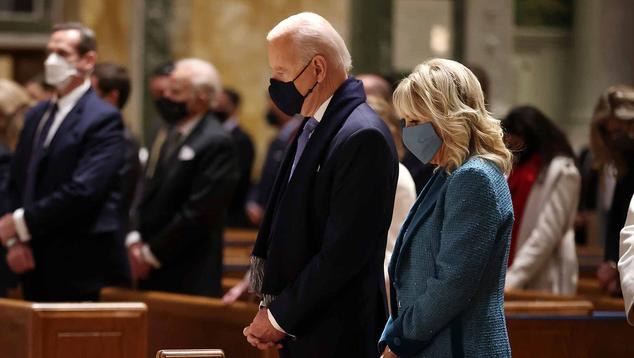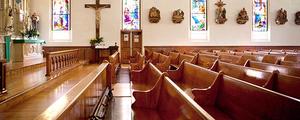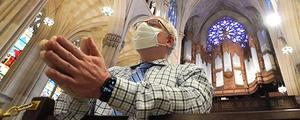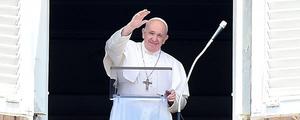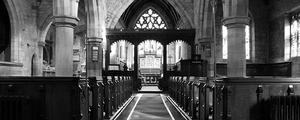Joe Biden, the second Catholic president in United States history, is quite public about his religion -- discussing it openly in last fall's presidential campaign and in the months since taking office, and regularly and publicly attending Catholic church services. So far, however, there is little evidence that Biden's Catholicism is resulting in unusually high approval ratings from his fellow Catholics. Segments of the American population defined by their religious identity continue to view the president through a partisan, rather than a religious, lens.
As my colleague Jeff Jones noted in a recent analysis of Gallup data collected in January, February and March of this year, Biden is receiving a 58% approval rating among Catholics. That is not significantly higher than his overall average of 56% for this time period, underscoring the conclusion that Biden isn't occupying an unusually positive position among Catholics so far.
Additional comparative analysis reinforces this finding -- that is, Biden's approval rating among Catholics is about where it would be for any Democratic president, Catholic or not.
The accompanying table shows different religious groups' approval ratings for Biden so far this year, as well as for Donald Trump during his last full calendar year in office (2020) and for Barack Obama during his last full year in office (2016).
| Biden, 2021 | Trump, 2020 | Obama, 2016 | |||||||||||||||||||||||||||||||||||||||||||||||||||||||||||||||||||||||||||||||||||||||||||||||||
|---|---|---|---|---|---|---|---|---|---|---|---|---|---|---|---|---|---|---|---|---|---|---|---|---|---|---|---|---|---|---|---|---|---|---|---|---|---|---|---|---|---|---|---|---|---|---|---|---|---|---|---|---|---|---|---|---|---|---|---|---|---|---|---|---|---|---|---|---|---|---|---|---|---|---|---|---|---|---|---|---|---|---|---|---|---|---|---|---|---|---|---|---|---|---|---|---|---|---|---|
| % | % | % | |||||||||||||||||||||||||||||||||||||||||||||||||||||||||||||||||||||||||||||||||||||||||||||||||
| U.S. adults | 56 | 44 | 52 | ||||||||||||||||||||||||||||||||||||||||||||||||||||||||||||||||||||||||||||||||||||||||||||||||
| Catholics | 58 | 43 | 54 | ||||||||||||||||||||||||||||||||||||||||||||||||||||||||||||||||||||||||||||||||||||||||||||||||
| Protestants | 47 | 54 | 43 | ||||||||||||||||||||||||||||||||||||||||||||||||||||||||||||||||||||||||||||||||||||||||||||||||
| Nones (No religious identity) | 71 | 27 | 69 | ||||||||||||||||||||||||||||||||||||||||||||||||||||||||||||||||||||||||||||||||||||||||||||||||
| White + Protestant + Attend church weekly/almost weekly | 26 | 73 | 23 | ||||||||||||||||||||||||||||||||||||||||||||||||||||||||||||||||||||||||||||||||||||||||||||||||
| Gallup | |||||||||||||||||||||||||||||||||||||||||||||||||||||||||||||||||||||||||||||||||||||||||||||||||||
Biden's approval rating so far this year is 12 percentage points higher than Trump's in 2020 (56% vs. 44%, respectively). The default value for the change in approval ratings across all demographic and religious groups, then, would be a gain of 12 points -- if everything else were equal.
Of course, everything else is not equal. To take the extreme case, Biden's job approval rating is an extraordinary 90 points higher now among Democrats than was Trump's in 2020 (Biden has 96% approval among Democrats; Trump had 6% in 2020). Biden's approval rating is 81 points lower among Republicans than was Trump's (91% vs. 10%). And, despite his higher approval overall, Biden's rating is lower than Trump's among White Americans, although higher among Black Americans; slightly lower among men, but higher among women.
And religion? Biden's approval rating among his fellow Catholics is up 15 percentage points compared with Trump's 2020 average among Catholics, a gain that is just slightly higher than Biden's overall average increase of 12 points. Catholics, in fact, hew fairly closely to the average approval rating for each president. Trump averaged 43% among Catholics in his last calendar year, close to his overall average of 44%, while Biden starts off his term averaging 58% among Catholics, also near his average of 56%. This doesn't suggest a huge "bump" for Biden in Catholics' approval vis-a-vis the rest of the nation.
Biden's approval rating among Catholics is also roughly in line with where it was for the last Democratic president, Barack Obama, who is generally classified as a Protestant "Christian" without a specific denominational affiliation (and certainly not a Catholic).
Obama's average approval rating was 52% in 2016, his last full calendar year in office. His approval rating among Catholics for that year was 54%, two points higher than his average. This is precisely the same two-point differential we see for Biden. Again, no sign of an extraordinary positioning for Biden among Catholics compared with his former boss.
Obama averaged 43% among Protestants in 2016, nine points below his average. Biden is averaging 47% among Protestants, also nine points below his average. The two also have broadly similar patterns among Americans with no religious identity -- the so-called "nones" -- with approval ratings among this group much higher than their averages.
Overall, we see the expected pattern across the last three presidents. Democratic presidents do best among "nones," and then Catholics and then Protestants. Republican Trump did best among Protestants, and then Catholics and then "nones."
There was (and still is, to some extent) a great deal of interest in the high levels of support Trump received among White Protestant evangelicals. Trump's approval rating among White Protestants who attend church very frequently, my working definition of evangelicals, was 73% in 2020. By contrast, Biden's approval rating among this group is 26%, similar to Obama's 23% rating among this group in 2016. In short, highly religious White Protestants are viewing Biden quite similarly to how they viewed his Democratic predecessor, suggesting again that it is the party of the president that is the operative factor determining approval ratings among religious groups, not his personal beliefs, policy actions or personality.
Kennedy Did Better Than Biden Among Catholics
John F. Kennedy was the only other Catholic president in U.S. history. His Catholicism was a major topic of discussion and news coverage when he ran for president in 1960 -- so much so that he felt forced to make a major speech in September 1960 before a large group of Protestant ministers in Houston, pledging famously that "I am not the Catholic candidate for president. I am the Democratic Party's candidate for president, who happens also to be a Catholic."
Although Biden has been very public about his Catholic religion, as noted, it is most certainly less of a factor for him now than it was for Kennedy some 60 years ago. In fact, a new Pew Research poll finds that 58% of Americans are aware that Biden is a Catholic, indicating that while the president's religion is known by a majority, it is certainly not universally recognized.
I am not aware of any polling in 1960 that asked the same question about Kennedy's religion, but my guess is that his Catholicism would have been much better known.
The salience of being a Catholic was also higher in 1960 than now. In 1960, about one in five Americans said they would not vote for an otherwise well-qualified candidate who happened to be Catholic. Gallup's most recent update in 2019 shows that this anti-Catholic bias has dwindled to 5%.
At any rate, the available data show that Kennedy's approval rating among Catholics ran about 11 to 19 percentage points higher than his overall average. This is a significantly higher Catholic "bump" than is the case for Biden or was the case for Obama, as we have seen.
Across Gallup polls conducted in 1961, 1962 and 1963, Kennedy's overall approval rating was 59% to 77%, with Catholic approval ratings ranging from 78% to 88%. (When Kennedy's approval fell to 59% in October 1963, the last Gallup poll conducted before his assassination, his approval among Catholics remained significantly higher, at 78%.)
We can't say for sure that it was Kennedy's religion that caused his relatively higher ratings among Catholics than is the case now for Biden; the partisan political landscape was different in many ways in 1960. But the comparison certainly helps put Biden's lack of unusual standing among Catholics into context.
Predictably, Biden Does Best Among Infrequent Church Attenders
The fact that Democratic presidents do so well among "nones" compared with Republican presidents underscores a basic principle in contemporary American politics: The less religious the individual, the more Democratic. Biden so far is proving to be no exception to this rule.
Biden's approval rating increases significantly as church attendance decreases, as can be seen in the accompanying table, rising from 45% among those who attend services weekly or almost weekly to 67% among those who never attend. Obama in 2016 generated almost the exact same pattern. Republican Trump, by contrast, received his highest approval among weekly attenders and his lowest among those who never attend.
| Biden, 2021 | Trump, 2020 | Obama, 2016 | |||||||||||||||||||||||||||||||||||||||||||||||||||||||||||||||||||||||||||||||||||||||||||||||||
|---|---|---|---|---|---|---|---|---|---|---|---|---|---|---|---|---|---|---|---|---|---|---|---|---|---|---|---|---|---|---|---|---|---|---|---|---|---|---|---|---|---|---|---|---|---|---|---|---|---|---|---|---|---|---|---|---|---|---|---|---|---|---|---|---|---|---|---|---|---|---|---|---|---|---|---|---|---|---|---|---|---|---|---|---|---|---|---|---|---|---|---|---|---|---|---|---|---|---|---|
| % | % | % | |||||||||||||||||||||||||||||||||||||||||||||||||||||||||||||||||||||||||||||||||||||||||||||||||
| U.S. adults | 56 | 44 | 52 | ||||||||||||||||||||||||||||||||||||||||||||||||||||||||||||||||||||||||||||||||||||||||||||||||
| Attend church weekly/almost weekly | 45 | 54 | 42 | ||||||||||||||||||||||||||||||||||||||||||||||||||||||||||||||||||||||||||||||||||||||||||||||||
| Attend church monthly/seldom | 56 | 45 | 52 | ||||||||||||||||||||||||||||||||||||||||||||||||||||||||||||||||||||||||||||||||||||||||||||||||
| Attend church never | 67 | 33 | 64 | ||||||||||||||||||||||||||||||||||||||||||||||||||||||||||||||||||||||||||||||||||||||||||||||||
| Gallup | |||||||||||||||||||||||||||||||||||||||||||||||||||||||||||||||||||||||||||||||||||||||||||||||||||
Bottom Line
Many observers asked why White Protestant evangelicals were so positive about President Trump given that he personally had little history of being highly religious and that his personal style and behavior were not in line with usual religious expectations. Now, one might ask why it is that the Catholic Joe Biden, demonstrably religious, does little better than average and no better than Obama among Catholics.
The answer, I believe, lies in the extraordinary power of partisanship in determining how Americans look at a president. Religious intensity and religious identity are highly correlated with party identification, and it appears that it is the latter variable that is the more powerful in determining views of a president. Trump's personal religiosity and behavior did not seem to have a negative effect on the support he received from highly religious White Protestants, and Biden's Catholicism doesn't appear to be having a positive effect on the support he receives from Catholics. The most important factor is straightforward: Biden is a Democrat and Trump was a Republican, and it is difficult for other presidential characteristics, including religion, to alter the power of this core reality.
